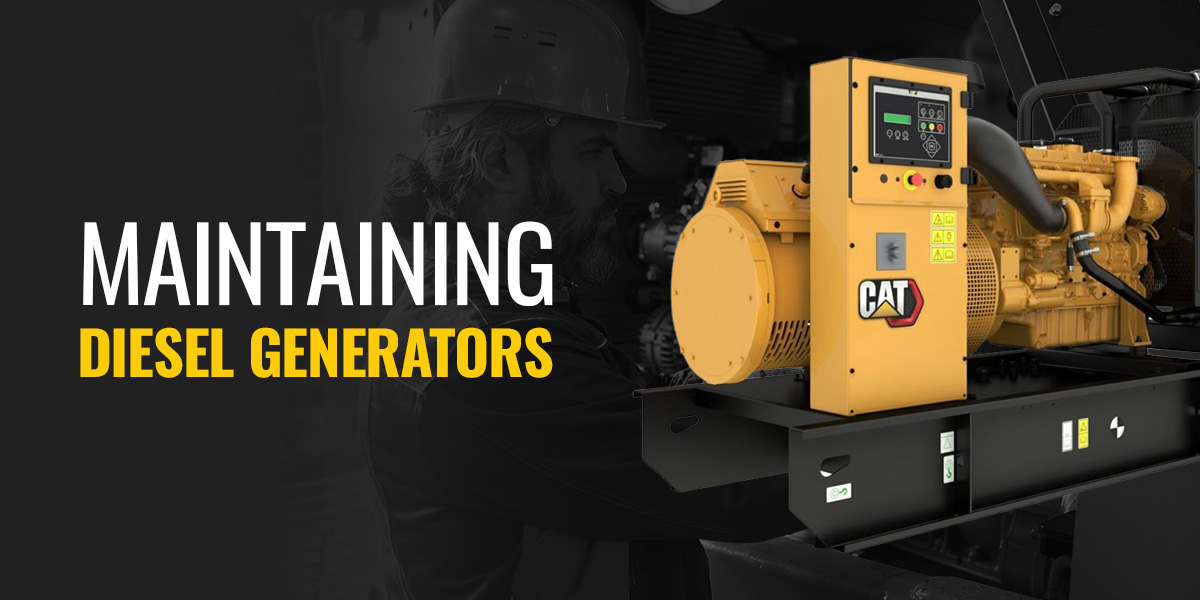

When you need prime or backup power, diesel generators provide continuous and uninterrupted energy to keep your operations running. But understanding how to maintain a generator is crucial if you want your genset unit to perform when needed.
Industrial generators are similar to what you’d find in a home genset, but the scales are much larger. Industrial units support higher, more extensive loads for longer periods. These generators are backup power sources that convert diesel into electrical energy. Types of generators include:
Each generator type is best used during specific situations, such as:
In particular, diesel generators help power hospitals, government buildings, airport telecommunications centers, and other critical locations that need immediate and consistent energy when a loss of power occurs.
But no matter what you have, maintenance is a universal need. Following the maintenance schedule suggested by the manufacturer is crucial for developing a proper generator schedule for each specific genset unit is the first step within the maintenance process.
Regular and preventive maintenance schedules are often consistent throughout different makes and models of diesel generators, but two factors can affect the frequency of preventive maintenance:
Both instances will require more frequent inspections. The maintenance process also changes based on the size or scale of your particular unit.
If you don’t have in-house technical personnel, partnering with the professionals can help you maintain a preventive maintenance schedule for commercial generator maintenance, which is especially helpful if you have multiple genset units at various locations.
It doesn’t matter what type of power outage you experience. Whether it’s a full-on blackout, permanent fault, or brownout, you can rely on generators to support your specific industry. When you experience a power outage, risks increase on many levels. For example, health care facilities can lose power to critical machines, and data centers can lose secure information. Ensuring your industrial generators are properly maintained and inspected regularly is the difference between reliable and unreliable energy.
If you have a diesel generator as your main source of backup power, upkeep is critical to a well-performing machine, as maintenance helps avoid power disruptions. Waiting too long to make repairs runs the risk of massive issues down the road that can lead to costly rebuilds.
Preventive maintenance is called preventive for that reason — it’s critical in maintaining the genset’s optimal performance levels to keep the equipment running long-term and to keep your operations safe. With proper maintenance, you can avoid the need for more extensive diesel generator repair.

The processes for maintaining large industrial diesel generators should follow a regular schedule throughout the year. You should conduct daily, weekly, monthly, and yearly inspections, each with different boxes to check. It takes only one technician to maintain a generator at a time, but make sure to keep records of repairs to help new inspectors understand what to look for.
Here are a few timelines to keep in mind:
General inspections are the first step. While they seem generic, these checks can help you catch small potential issues that often go unseen. Check parts of the genset as follows:
Look for concerns like corrosion or leaks. You should also listen for odd noises and check for changes in engine performance.
You will also want to ensure there is sufficient airflow between the exhaust and other machines or surrounding areas so the diesel generator is not overheating the space.
Using a dipstick, keep an eye on the engine’s oil level. Do this when the generator is off and the oil has had time to settle. Oil and filter changes are common once per year, but you should check your owner’s manual for manufacturer recommendations. Remember to dispose of the oil and filters properly to ensure no environmental damage occurs.
Inspect the coolant level during planned maintenance routines after the diesel engine is shut down and cooled. Top it up when low, but make sure you’re adding the correct fluid. Some genset units take a mix of additives like water, antifreeze, and coolant.
Wipe down your diesel generator with a cloth to remove contaminants such as dirt, dust, and other debris. To remove tougher materials, use compressed air and be sure to get rid of any obstructions.
Replacing fuel filters keeps the unit’s performance levels high. Diesel can become contaminated and degrade over time, so it’s important to replace filters often to keep things running smoothly. The dirty fluid can clog the fuel filters and lines. Check your manual to see how often to change fuel filters — it might be around every 500 hours of use. You will also want to remove any water vapor and moisture that accumulates in the fuel tank.
Since diesel can become dirty over time, run a fuel test during maintenance to check for water vapor levels, degradation, and chemical build-up. Additives often boost the fuel back to stable conditions so you don’t have to waste the diesel that’s already in the unit.
Generator battery maintenance is a priority when it comes to your diesel genset. Without a juiced-up battery, your generator will fail because the battery absorbs the power load. The shelf-life of a battery depends on the make, but they all degrade over time.
Have your maintenance schedule include replacing the generator’s battery at the end of its lifecycle to prevent failures. Always make sure it’s charged and check for deterioration. If corrosion is present, clean the terminals with the correct solution according to your unit’s manual.
A load bank test shows how the diesel genset works under a fake load, running at full operating temperatures. This will help you see the overall performance levels of the generator. It’s also smart to run the unit on a regular basis when not in use to charge the battery and keep things lubricated. This maintenance step is called generator exercise, which also helps the unit go from cold starts to being operational within seconds.
When a diesel generator shuts down under load, it can leave your business scrambling for support. The key to preventing shutdowns is preventive and regular maintenance. Partner with Thompson Power Systems to keep your operations running, no matter if you need standby or prime energy. Our experts are reliable, trustworthy, and experienced when it comes to diesel generator maintenance to deliver a premium level of support. Because you are our biggest asset, you can feel confident we will take care of you when inspections are due.
View our power generation sets online or reach out to a Thompson Power System team member to speak with us one-on-one about setting up a maintenance schedule for your diesel generator.
